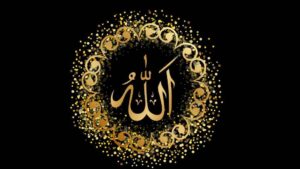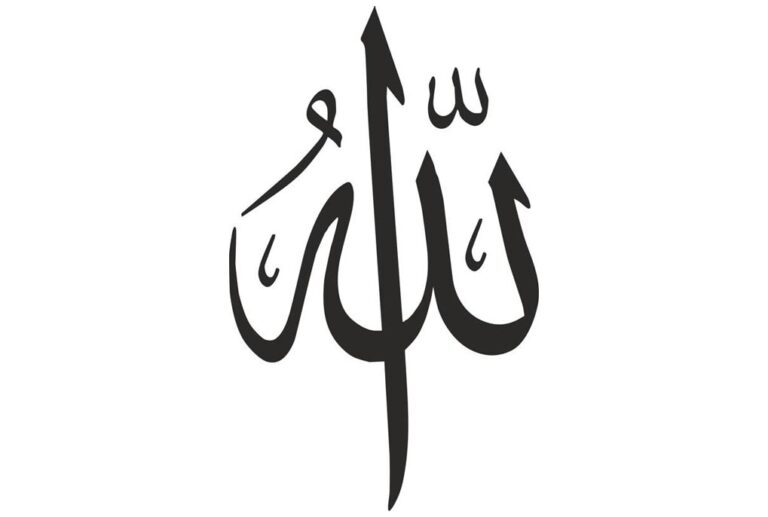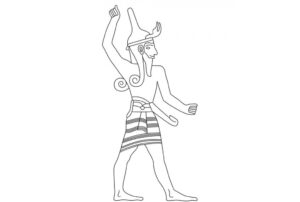Table of Contents
“Allah” represents the Arabic term for God, and Muslims utilize this term to denote the singular and supreme deity in Islam. In Islamic theology, he is viewed as all-powerful, merciful, and compassionate. Followers of Islam, known as Muslims, believe in the oneness of God and recognize Prophet Muhammad as the final messenger.
Muslims adhere to the teachings of the Quran, their holy scripture believed to be the literal word of God as revealed to Prophet Muhammad through the angel Gabriel. The Quran serves as a comprehensive guide for matters of faith, practice, and morality in Islam.
In their daily lives, Muslims worship and submit to Allah, seeking guidance and forgiveness through prayer, virtuous actions, and adherence to Islamic principles. The concept of God in Islam shares similarities with the monotheistic beliefs of Judaism and Christianity, albeit with distinct theological nuances.
Purpose

The purpose of God, as understood in Islamic theology, is to be the singular and supreme deity, all-powerful and merciful. He is actively involved in the guidance and sustenance of the universe, according to Islamic beliefs. Muslims believe that Allah created humanity with the purpose of worshiping and obeying Him. The Quran, revealed to Prophet Muhammad, serves as a comprehensive guide for human conduct, morality, and spiritual fulfillment, outlining the purpose of life and the path to righteousness. Allah’s purpose, as perceived by Muslims, involves establishing a relationship with humanity through prayer, adherence to moral principles, and the pursuit of justice and compassion in the world.
Origins
The origins of Allah, within the Islamic framework, involve the belief in a single, all-powerful deity who created the universe and is actively involved in guiding and sustaining it. The monotheistic foundation of Allah’s concept aligns with the broader Abrahamic traditions, connecting Islam with the beliefs of Judaism and Christianity. In Islamic theology, Allah is eternal, without beginning or end, and is uniquely distinct from His creation. The Quranic revelations to Prophet Muhammad in the 7th century CE in the Arabian Peninsula are central to understanding the origins and nature of the concept of Allah in Islam.
Legends and Stories
In Islamic theology, there are no legends or stories surrounding Allah in the manner of mythical tales or folklore. Instead, Muslims regard Allah as the supreme and transcendent deity, beyond human comprehension. The Quran, the holy book of Islam, is considered the literal word of God, revealed to Prophet Muhammad through the angel Gabriel, and it serves as the primary source of guidance.
Islamic tradition emphasizes the oneness of Allah and the importance of worshiping Him alone. The Quran contains narratives about various prophets and their communities, as well as ethical and moral guidance. However, these accounts are not presented as legends or stories in the conventional sense but as historical and moral lessons meant to guide believers in their faith and conduct.
Muslims also follow the Hadith, which are the sayings and actions of Prophet Muhammad. These texts provide additional context to the teachings of Islam but are secondary to the Quran in terms of authority.
It’s essential to approach discussions about Allah with sensitivity and respect, as Muslims regard Allah with the utmost reverence, and discussions about the divine are treated with seriousness and piety within the Islamic tradition.
The Case of the Origin of Allah
The origin of Allah lies in the monotheistic beliefs of Islam, rooted in the teachings revealed to Prophet Muhammad during the 7th century CE. According to Islamic theology, Allah is the Arabic term for God, and the Quran, considered the literal word of God, serves as the primary source outlining the nature, attributes, and commandments of Allah.
The concept of Allah’s origin is intricately tied to the belief in a singular, all-powerful deity who created the universe and actively governs it. Unlike human or created entities, Allah is deemed eternal, without a beginning or end, and distinct from His creation.
The Quranic revelations, received by Prophet Muhammad through the angel Gabriel, articulate the fundamental tenets of Islamic monotheism. These teachings emphasize the oneness of Allah and His role as the ultimate authority and creator. The concept of Allah’s origin, within the Islamic framework, aligns with the broader Abrahamic traditions shared with Judaism and Christianity.
Muslims consider discussions about God with great reverence, approaching them as matters of profound spiritual significance. It is through the Quran and the teachings of Prophet Muhammad that the origin and nature of Allah are elucidated in Islamic theology.
Mohammed Solidifies Concept of One God
Muhammad solidified the concept of one God in the 7th century CE, shaping the monotheistic beliefs that form the core of Islam. As the final prophet in Islamic tradition, Muhammad received revelations from the angel Gabriel, which were compiled into the Quran. Through these revelations, Muhammad emphasized the oneness of God, known as Allah in Arabic.
Muhammad’s teachings focused on monotheism, rejecting the multitude of deities worshiped in pre-Islamic Arabia. He proclaimed Allah as the sole creator and sustainer of the universe, highlighting the transcendence and uniqueness of the Islamic concept of God.
The Quran, considered by Muslims as the literal word of God, served as a foundational text that solidified the monotheistic beliefs Muhammad preached. Through his leadership and the dissemination of Quranic teachings, Muhammad played a pivotal role in unifying the Arabian Peninsula under the banner of Islam and establishing the concept of one God as a central tenet of the faith.
Family
In Islamic theology, there is no concept of a “family of Allah” in the way it is understood in human or familial terms. Islam strongly emphasizes the absolute oneness and uniqueness of Allah, who is considered transcendent and beyond human attributes and relationships.
Muslims believe that Allah is not begotten, nor does He beget, and there is nothing comparable to Him. The idea of a divine family or offspring is explicitly rejected in Islam. The Quran, the holy book of Islam, affirms the oneness of Allah and rejects any form of association with Him.
Islamic teachings emphasize a direct and personal relationship between each individual and Allah, without intermediaries or familial constructs. Muslims believe in worshiping and submitting to Allah alone, recognizing Him as the sole creator and sustainer of the universe. The focus is on the individual’s devotion, obedience, and connection with the singular and transcendent deity.
Appearance

Islamic teachings emphasize the oneness and uniqueness of God, rejecting anthropomorphism or any attempt to attribute human-like qualities to the divine. The Quran, the holy book of Islam, underscores the transcendence of Allah and cautions against making any visual representations or depictions of Him.
Muslims focus on worshiping and obeying Allah based on the guidance provided in the Quran and the teachings of Prophet Muhammad. The emphasis is on the spiritual and moral connection with Allah, recognizing His attributes of mercy, justice, and compassion, rather than attempting to visualize or imagine a physical appearance.
Symbology
In Islamic theology, God is symbolized by various attributes and symbols that convey the divine qualities and principles emphasized in the Quran. One significant symbol is the Arabic calligraphy of the word “Allah” itself, often artistically rendered to represent the beauty and majesty of the divine.
The Quranic verses and names of Allah, such as Ar-Rahman (The Most Merciful) and Al-Quddus (The Holy), serve as symbolic representations of the divine attributes. These symbols are used to deepen the understanding and contemplation of Allah’s nature, fostering a spiritual connection for believers.
Additionally, the crescent moon and star, while not directly representing Allah, are commonly associated with Islam and its cultural identity. These symbols are not religiously mandated, and the primary focus in Islam is on the worship of the unseen and transcendent Allah.
Islamic art, architecture, and calligraphy often incorporate these symbols to evoke a sense of spiritual significance and beauty, enhancing the overall aesthetic experience for believers without ascribing a physical form to Allah. The emphasis remains on the symbolic representation of divine attributes and the oneness of God in a way that respects the Islamic prohibition against creating physical representations of Allah.
FAQ
Who is Allah?
Allah is the Arabic term for God in Islam, representing the singular and supreme deity.
What does Allah mean?
Allah means God in Arabic, representing the one and only deity in Islam.
What does Allah look like?
In Islamic theology, there is no physical appearance attributed to Allah. Allah is considered beyond human comprehension and transcendent.
Who is Allah in Islam?
In Islam, Allah is the central and unique deity, believed to be all-powerful, merciful, and the creator of the universe. Muslims worship and submit to Allah.
What does Allah Akbar mean?
"Allahu Akbar" means "Allah is the Greatest" in Arabic. It is a common phrase used by Muslims to express praise, glorify Allah, and acknowledge His supremacy.
What religion is Allah?
Allah is a term used in Islam to refer to the monotheistic deity worshiped by Muslims.
Who is Allah in the Bible?
In the Bible, the term "Allah" is not used; rather, the Christian concept of God is described.
How to ask Allah for forgiveness?
Muslims seek forgiveness from Allah through sincere repentance, remorse for wrongdoing, and asking for forgiveness in prayers (dua).
What is the difference between God and Allah?
The term "God" is a general term for a deity, while "Allah" is the specific Arabic term for the one God in Islam. The theological concept of a singular, supreme deity is similar in Islam, Christianity, and Judaism.
How to pray to Allah?
Muslims pray to Allah through the five daily prayers (Salah), following a specific set of physical postures and recitations.
Where is Allah?
Allah is believed to be omnipresent, transcending physical location and space in Islamic theology.
Where did Allah come from?
In Islamic belief, Allah is eternal and has no origin. Allah is considered uncreated and without beginning or end.
What does Masha Allah mean?
"Masha Allah" is an Arabic phrase expressing appreciation or awe, often used when witnessing something impressive or beautiful. It means "What Allah has willed."
How many names does Allah have?
Allah is believed to have 99 names or attributes (Asma ul Husna) in Islam, each describing a different aspect of His nature.
How does Allah look?
In Islamic theology, there is no physical description of Allah. Allah is considered beyond human comprehension and perception.
How to repent to Allah?
Repentance to Allah involves acknowledging wrongdoing, feeling remorse, seeking forgiveness, and making a sincere commitment to avoid repeating the mistake.
Who created Allah?
In Islamic belief, Allah is uncreated and eternal. He is not created by anyone; rather, He is the creator of all things.
What does Allah SWT mean?
"SWT" is an abbreviation for the Arabic phrase "Subhanahu wa Ta'ala," which means "Glorified and Exalted is He." It is used out of reverence when referring to Allah.
Why did Allah create us?
According to Islamic belief, Allah created humans to worship Him and lead righteous lives, with the ultimate purpose of attaining paradise in the afterlife.
What does Jazak Allah mean?
"Jazak Allah" is an expression of gratitude in Arabic, meaning "May Allah reward you." It is often used to thank someone.
How to pronounce Allah?
Allah is pronounced as "Ah-lah."
How to get closer to Allah?
Muslims believe getting closer to Allah involves performing acts of worship, engaging in righteous deeds, seeking knowledge, and maintaining a sincere and humble heart.
Who is Allah in the Quran?
In the Quran, Allah is described as the creator, sustainer, and judge. The Quran serves as the primary source of guidance for Muslims, revealing Allah's attributes and commandments.
What does Allah mean in English?
In English, Allah translates to God, representing the Islamic concept of the one and only deity.
Who is Allah picture?
In Islam, the depiction of Allah in pictures or images is strictly prohibited. Allah is beyond human representation, and Muslims avoid visual representations.
When Allah wants two hearts to meet Hadith?
The phrase "When Allah wants two hearts to meet" is not a specific Hadith, but it is often used in a broader sense to express the belief that connections and relationships are divinely guided.
How to thank Allah?
Muslims express gratitude to Allah through prayers, acknowledging blessings, and by using phrases like "Alhamdulillah" (All praise is due to Allah).
What are the 99 names of Allah?
The 99 names of Allah, known as Asma ul Husna, are a list of divine attributes mentioned in the Quran and Hadith that describe various aspects of Allah's nature.
What does Ma Sha Allah mean?
"Ma Sha Allah" is an Arabic phrase expressing admiration or acknowledgment, often used to convey that an event or achievement is by the will of Allah.
What does Allah Akbar mean?
"Allah Akbar" means "Allah is the Greatest" in Arabic. It is a common phrase used by Muslims to express praise, glorify Allah, and acknowledge His supremacy.
Who believes in Allah?
Muslims, followers of Islam, believe in Allah as the one and only deity.
How is Zakat an example of the will of Allah?
Zakat, one of the Five Pillars of Islam, is considered an act of charity and an obligation that aligns with the will of Allah for Muslims to help those in need.
What does Allah yerhamo mean?
"Allah yerhamo" is an Arabic expression used to convey condolences for someone who has passed away. It means "May Allah have mercy on him/her."
How old is Allah?
In Islamic belief, Allah is eternal and without a specific age. Allah is considered timeless, with no beginning or end.




